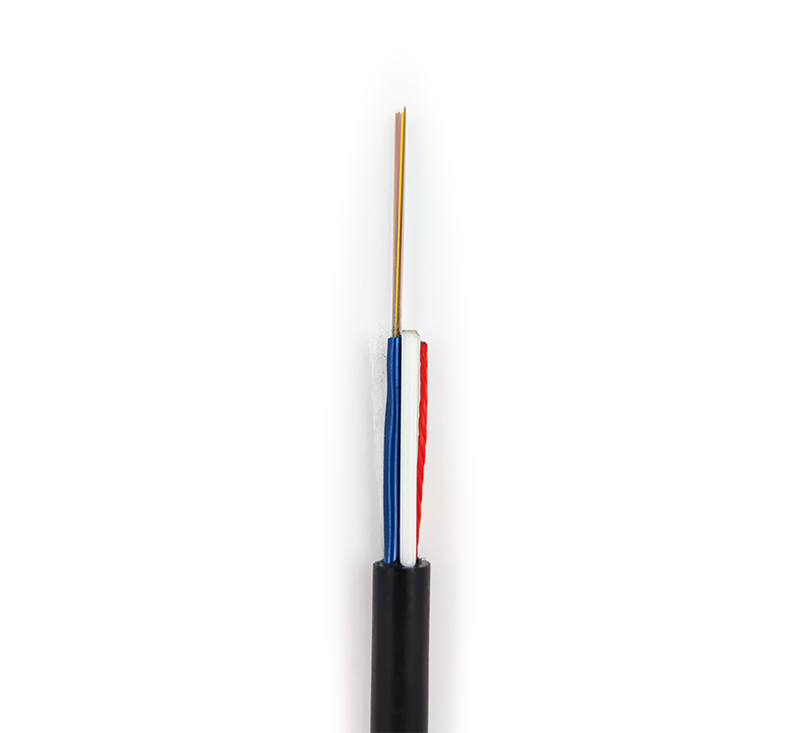Outdoor optical cable is simply used for outdoor optical cable, which belongs to a kind of optical cable. It is called outdoor optical cable because it is most suitable for outdoor use. It is durable and can withstand wind, sun, cold, and wind. , It has some mechanical equipment characteristics and environmental characteristics such as compressive resistance, corrosion resistance and compressive strength.
Common outdoor optical cables are divided into two types of central bundled and stranded cables:
Bundle tube: The raw material of the bundle tube is PBT, which is hard and soft, and resists lateral pressure. Some small processing plants use PP to replace PBT, and the cost can be reduced by half, but the optical fiber inside is very easy to break during the transportation and construction of the optical cable. The color of PP is transparent.

2. Colored optical fibers: In order to better distinguish each core optical fiber in the optical cable, the bare fiber is squeezed with a layer of colorful plastic. The outdoor optical cable is to stain each core bare fiber with printing ink of different colors. The color of the ink is the same as that of the cable in the room, and there are 12 kinds. Brown, gray, this (white), red, black, yellow, purple, pink, turquoise. The use of primary colors in place of milky whites is permitted without hazard identification.
3. Color-locked optical fiber: In order to maintain the optical fiber, a layer of 250μm transparent color epoxy resin is coated on the surface, and the optical fiber needs to be colored with different colors for each core fiber when it is made into an optical cable. Therefore, there are some overseas optical fiber manufacturing enterprises. , 12 different colors of epoxy resin are coated on the optical fiber in the production process, so that the optical fiber cable factory does not need to color it when it is applied. The advantage of doing so is to save a coloring process, but the disadvantage is that it cannot be flexibly matched during application.
4. Water blocking tape: The water blocking tape is made of water-blocking powder in the middle of the double-layer non-proof cloth. Once the optical cable sees water, the powder rapidly expands dozens of times after absorbing moisture, causing the glue like crystal jelly to block it. The water spreads deeper into the cable.
5. Non-proof cloth: Some manufacturers use non-proof cloth to replace the water-blocking tape with much lower cost than the water-blocking tape to control the cost. There is no difference in external viewing. Once the skin of the optical cable is cracked, no water-proof cloth can block water.
6. Embossed strip steel: The water blocking strip is covered with embossed strip steel. The primary function of the steel strip in the optical cable is to resist lateral pressure, compressive strength, prevent rat bites, and maintain the bundle.
7. Steel wire: There are two parallel steel wires outside the strip. The function of the steel wire is to improve the tensile strength of the optical cable. The dark gray steel wire on the surface is phosphated by pickling, and the silver-white steel wire is treated by hot-dip galvanizing. The effect is to avoid the corrosion of the steel wire.
8. The grommet of the optical cable: The outdoor optical cable generally uses high-density high-pressure polyethylene (MDPE), and there are also some customers who require high-density high-density polyethylene (HDPE). The cost of applying high-density PE is slightly higher. There are also specific low-smoke halogen-free raw materials (LSZH) as grommets, and many manufacturers also use purchased materials as optical cable grommets to control costs. It is very easy to crack and leak. The main source of recycled materials is to smash and re-refine some cable and wire sheaths, plastic bottles, sandals, etc., and then granulate again.










